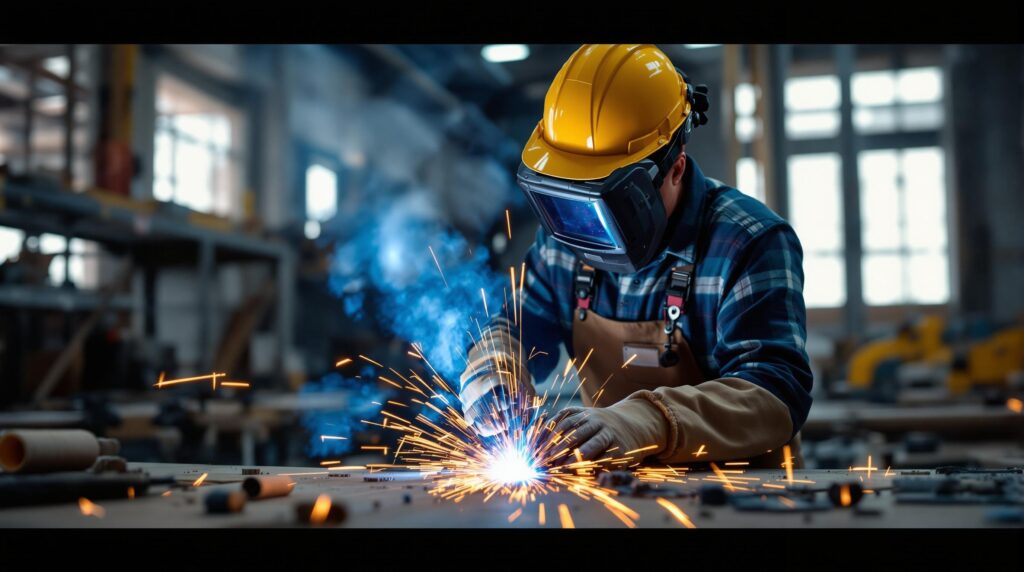The best-paying jobs in metal fabrication include welders ($47,010 median salary), fabrication supervisors ($70,000+), industrial engineers ($95,300), CNC programmers ($60,000+), and metallurgists ($100,000+). Specialized skills, certifications, and experience increase earning potential in this field.
The average hourly rate for these roles ranges from $22 to $48, providing a clear perspective on earnings within the industry.
Introduction to Metal Fabrication
Metal fabrication is an important process in various industries, including construction, manufacturing, and engineering. It involves the creation of metal products by cutting, bending, and assembling metal sheets, plates, and other materials. This intricate process is fundamental to producing the components and structures that form the backbone of modern infrastructure and technology.

Definition of Metal Fabrication
Metal fabrication is the process of creating metal products by cutting, bending, and assembling metal sheets, plates, and other materials. It involves various techniques, including welding, machining, and forming, to create the desired shape and structure. These processes require precision and skill, making metal fabrication a specialized field that demands both technical knowledge and hands-on expertise.
Types of Metal Fabrication Jobs
There are several types of metal fabrication jobs, each with its own set of responsibilities and required skills. Some of the key roles include:
- Metal Fabricator: Responsible for cutting, bending, and assembling metal products. This job requires a keen eye for detail and proficiency with various tools and machinery.
- Welder: Joins metal parts together using heat and pressure. Welders must be skilled in different welding techniques and understand the properties of various metals.
- Machinist: Cuts and shapes metal parts using machine tools. Machinists need to be adept at operating lathes, mills, and other precision equipment.
- Metal Finisher: Applies coatings and finishes to metal products to enhance their appearance and protect them from corrosion. This role often involves working with chemicals and specialized equipment.
Importance of Metal Fabrication in Various Industries
Metal fabrication is essential in various industries, including:
- Construction: Metal fabrication is used to create building frames, roofing, and other structural elements. The strength and durability of metal make it an ideal material for construction projects.
- Manufacturing: Metal fabrication is used to create machinery, equipment, and other products. From small components to large industrial machines, metal fabrication is integral to the manufacturing process.
- Engineering: Metal fabrication is used to create prototypes, models, and other engineering components. Engineers rely on fabricated metal parts to test and refine their designs.
- Automotive: Metal fabrication is used to create car parts, including body panels and engine components. The precision and reliability of fabricated metal parts are crucial for vehicle performance and safety.
Industry Demand for Metal Fabricators
Metal fabrication plays an important role in industries such as construction, automotive, aerospace, and manufacturing. Employers seek skilled workers to meet production demands, and salaries vary based on experience, certifications, and location. The national average salary for metal fabricators depends on factors like industry type and geographic region. The average hourly wage for metal fabricators includes both core compensation and total hourly cash compensation, with various factors influencing pay levels and presenting a range of hourly wages and incentives in the United States.
In metropolitan areas, salaries tend to be higher due to increased demand and cost of living. For example, metal fabricators in Columbia, SC, earn higher than the national average due to a strong manufacturing presence.
Highest Paying Jobs in Metal Fabrication
The top-paying jobs in metal fabrication require technical skills, certifications, and experience. Education plays an important role in securing these high-paying positions, with qualifications such as a High School Diploma or Tech Certificate being highly valued. Below is a breakdown of high-paying roles and their average salaries.
Metal Fabrication Salary Table
Presented in a table format with salaries in USD:
| Job Title | Average/Median Salary (USD) | Top Earners’ Salary (USD) |
|---|---|---|
| Laser Engineer | $64,500 – $161,500 | – |
| Industrial Engineer | $80,816 | – |
| Metallurgist | $90,799 | – |
| Construction Superintendent | $90,463 | – |
| Manufacturing Manager | $94,388 | – |
| Metallurgical Engineer | $109,000 | $174,000 |
| Boilermaker | $59,227 – $82,568 | $119,500 |
| CNC Programmer | $71,848 | – |
| CNC Machinist | $58,670 | – |
| Millwright | $66,816 | – |
| Ironworker | $60,844 | – |
| Sheet Metal Mechanic | $55,350 – $59,959 | $74,920 |
| Fabricator | $53,175 | – |
It’s important to note that salaries can vary base
Top Roles Explained
1. Industrial Engineers – $95,300 Average Salary
Industrial engineers optimize manufacturing processes to improve efficiency and reduce waste. They work in metal fabrication plants, construction firms, and automotive manufacturing. A bachelor’s degree in industrial engineering is typically required.
Utilizing job search resources is crucial for finding industrial engineering positions in metal fabrication.
2. Metallurgists – $100,000+ Average Salary
Metallurgists study metal properties and processes to improve strength and durability. This job requires a degree in metallurgy or materials science and is common in aerospace and automotive industries. Platforms like Glassdoor can provide insights into company reviews and salary information for metallurgists.
3. CNC Programmers – $60,000+ Average Salary
CNC programmers write computer-controlled machining instructions for fabricating metal parts. Employers prefer candidates with CAD/CAM software experience and certifications in CNC programming.
4. CNC Machining and High-Tech Metalworking
CNC machining is a high-demand skill in automotive, aerospace, and precision manufacturing.
- CNC Programmers – Write programs for computer-controlled machining, earning $70,000+ per year.
- CNC Machinists – Operate CNC lathes, mills, and routers, earning $58,670 annually.
Employers prefer candidates with CNC programming certifications and experience using CAD/CAM software.
5. Boilermakers – $82,568 Average Salary
Boilermakers assemble and repair boilers, tanks, and pressure vessels. This role requires welding expertise, blueprint reading skills, and safety training.
6. Millwrights – $66,816 Average Salary
Millwrights install and repair heavy machinery in metal fabrication plants. They must have knowledge of mechanical systems, hydraulics, and welding.
7 . Welding Careers and Specializations
Welders earn $47,010 median salary, but certain specializations command higher pay.
- Underwater Welders – Earn $100,000+ annually, working in hazardous conditions to repair offshore pipelines and ship structures.
- Pipeline Welders – Earn $70,000+ per year, welding oil and gas pipelines.
- Aerospace Welders – Work in aircraft manufacturing, earning $60,000+ per year.
Certifications such as the AWS Certified Welding Inspector (CWI) can significantly increase a welder’s earning potential.
8. Structural and Sheet Metal Work: High-Paying Opportunities
Sheet metal mechanics and ironworkers play key roles in construction and metal fabrication.
- Ironworkers – Earn $60,844 annually, installing steel structures in bridges, buildings, and industrial plants.
- Sheet Metal Mechanics – Fabricate HVAC duct systems and custom metal components, earning up to $74,920.
There are numerous metal fabricator job openings across various locations, with detailed salary information available for those considering this career path. In the United States, metal fabricators can expect an average pay range that includes additional compensation data.
Certifications such as the Sheet Metal Workers’ International Association (SMWIA) apprenticeship program can improve job prospects.
Benefits and Perks for Metal Fabricators
In addition to their salaries, metal fabricators may receive various benefits and perks, including:
- Health Insurance: Many employers offer health insurance to their metal fabricators, providing coverage for medical expenses and promoting overall well-being.
- Retirement Plans: Some employers offer retirement plans, such as 401(k) or pension plans, helping metal fabricators save for their future.
- Paid Time Off: Metal fabricators may receive paid vacation days, sick leave, and holidays, allowing them to balance work and personal life.
- Training and Development: Many employers offer training and development programs to help metal fabricators improve their skills and advance their careers. Continuous learning is essential in this field to keep up with technological advancements.
- Safety Equipment: Metal fabricators may receive safety equipment, such as gloves, safety glasses, and earplugs, to protect them from workplace hazards. Ensuring a safe working environment is a top priority in metal fabrication.
By understanding the various aspects of metal fabrication, from job roles to salary and benefits, individuals can make informed decisions about pursuing a career in this dynamic and essential field.
How to Increase Your Salary in Metal Fabrication
Certifications That Boost Earnings
Employers prefer workers with certifications, which can lead to higher salaries.
- AWS Certified Welding Inspector (CWI) – Required for high-paying welding jobs.
- NIMS Machining Level I & II – Essential for CNC machinists and programmers.
- OSHA Safety Certification – Increases job eligibility in industrial metal fabrication.
Best Locations for Metal Fabricators
Salaries vary by state and city. The highest-paying states for metal fabrication jobs include:
- Alaska – High demand for welders and fabricators in the oil industry.
- Texas – Strong metalworking sector in Houston and Dallas.
- California – High wages for CNC machinists and fabrication supervisors.
Metropolitan areas such as Chicago, Detroit, and Columbia, SC, offer some of the highest salaries in the industry.
FAQs About Metal Fabrication Careers
How is automation affecting the role of metal fabricators?
Automation is changing metal fabrication but not replacing human workers. Fabricators must learn CNC operation, robotic welding, and CAD software to stay competitive.
What are some emerging sustainable practices in metal fabrication?
Manufacturers are using recycled metals, energy-efficient machinery, and 3D metal printing to reduce waste and environmental impact.
How is the metal fabrication industry addressing the skills gap?
Employers are investing in apprenticeships, vocational training, and cross-training programs to develop a skilled workforce.
What role does virtual reality (VR) play in modern metal fabrication?
VR is used for training and design visualization, allowing fabricators to practice techniques and preview products before production.
Conclusion
Metal fabrication offers high-paying jobs in welding, CNC machining, metallurgy, and industrial engineering. Specialized skills, certifications, and experience increase earning potential. Workers in metropolitan areas and high-demand industries earn above the national average.
For those considering a career in metal fabrication, technical training, certifications, and experience are the keys to securing the highest-paying jobs.







